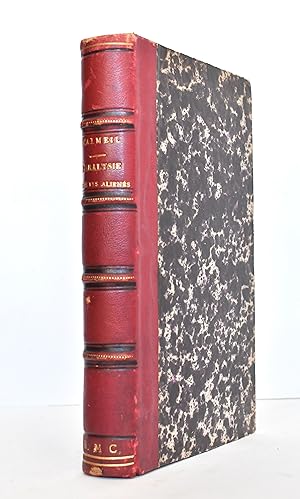Beschreibung
1 vol. in-8 (21 x 13.5 cm), (4), II, 446 pp., demi-chagrin rouge, dos à nerfs, au chiffre R.M.C. gravé en queue (chiffre de René de Musgrave-Clay, médecin à Pau dans la seconde moitié du XIXe siècle), petites rousseurs éparses sur certains feuillets, ancien cachet et cote de bibliothèque au titre et cachet sur deux autres pages, assez bon état. Edition originale. Cette description devenue classique de la paralysie générale associée à l'inflammation chronique du cerveau est basée sur 62 observations anatomo-cliniques minutieusement rapportées. Il s'agit de la première corrélation anatomo-clinique en pathologie mentale et de la première découverte capitale en recherche neuro-psychiatrique. Calmeil ne reconnaît cependant pas que la paralysie générale est une entité à part (syphilis) et pas simplement une complication de la maladie mentale. Louis Florentin Calmeil (1798-1895), externe de Pinel et Esquirol, devint l'interne de Royer-Collard puis obtint grâce à Esquirol le poste de médecin inspecteur du service de santé. Il fut ensuite nommé médecin en chef de la Maison de Charenton. REFERENCES : Garrison & Morton, 4797: "Classic description of general paralysis. Calmeils work complements Bayle's earlier delineation of general paralysis (No. 4795). Between the two of them they established the clinical picture of general paralysis of the insane, associating it with chronic inflammation of the brain. This was the first breakthrough in neuro-psychiatric research, and it gave psychiatry the spur to precise and systematic clinical, pathological, and statistical innovation on its own terms."; The Haskell F. Norman Library, 389: "Calmeil was a pupil of Esquirol. His treatise contains the classic description of general paralysis of the insane, along with an attempt to correlate the pathology of the disease with its clinical manifestations. However, Calmeil did not recognize that general paralysis was a separate disease entity and not simply a complication of mental illness."; Macia F & Ardagna Y: Historical reflections on neurosyphilis based on the 1826 treatise on general paralysis in demented patients by Louis Florentin Calmeil (1798?1895), Rev Neurol (Paris), 2018, 174(4), 247-254: "General paralysis is a neurological symptom of tertiary syphilis that was first identified in asylums as paralytic madness. The enlightened discussion of 60 clinicopathological cases provided by Louis Florentin Calmeil in his 1826 treatise greatly improved our knowledge of general paralysis. However, Calmeil was unable to relate this symptom to syphilis, although the latter was quite widespread at that time. Following a detailed reanalysis of Calmeil's observations with special attention to his clinical and demographic data, we conclude that this eminent clinician was unable to define the cause of general paralysis because his early 19th century mind was still under the influence of traditional knowledge and moral prejudices. For Calmeil, general paralysis belonged entirely to the realm of psychiatry."; Pearce JMS: Brain Disease Leading to Mental Illness: A Concept Initiated by the Discovery of General Paralysis of the Insane, Eur Neurol 2012, 67, 272?278 : "In the early 19th century the prevailing alienist (psychiatrists?) view was that organic lesions did not cause madness. The history of general paralysis of the insane (GPI) rests on four early publications which changed this concept: Haslam's Observations on insanity, Bayle's Recherches sur l?arachnitis chronique, Calmeil's De la paralysie considérée chez les aliénés, and Esmarch and Jessen's Syphilis und Geistesstörung. Calmeil and Delaye emphasized clinicopathological correlation and stressed the importance of white matter disease in causing dementia. GPI was to prove a crucial starting point in which the causes of mental illness were slowly transformed from psychogenic disturbances of mind and spirits to organically determined diseases."; Semelaigne R : Les pionniers de la psychiatrie française, p.233. Bestandsnummer des Verkäufers 1387-1
Verkäufer kontaktieren
Diesen Artikel melden
Bibliografische Details
Titel: De la paralysie chez les aliénés, recherches...
Verlag: Paris, J.-B. Baillière, 1826
Erscheinungsdatum: 1826
Einband: Couverture rigide
Zustand: Assez bon
Auflage: Edition originale
![]()

